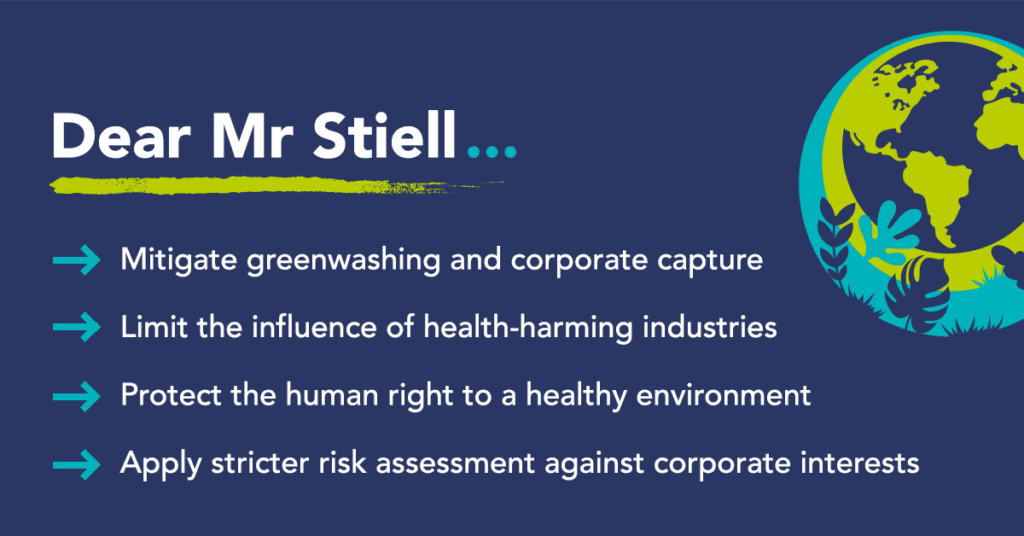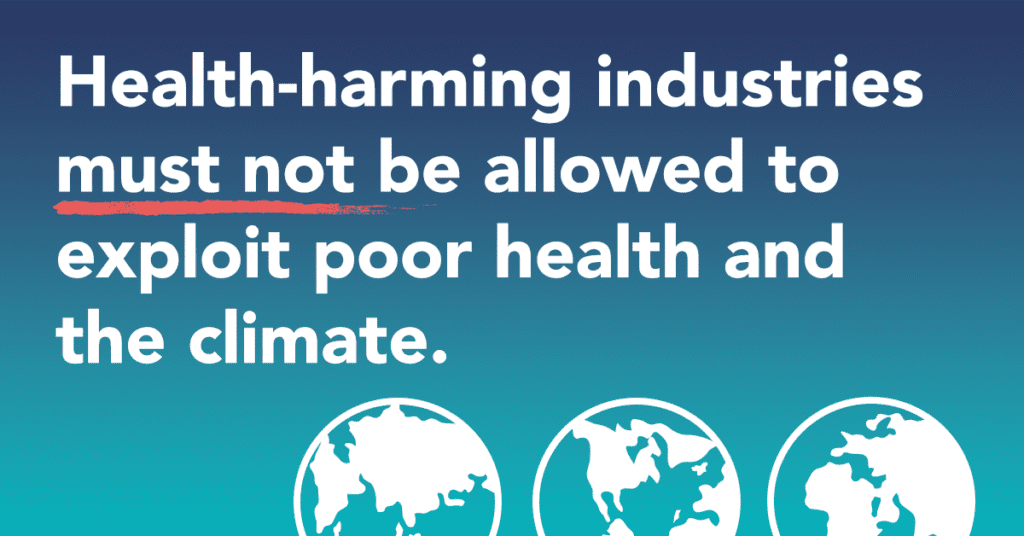Human and planetary health are deeply connected. And we all want to be healthy and live on a healthy planet. The problem is that the products and practices of health harmful industries, such tobacco, alcohol and sugary drinks companies, are causing massive harms to people and planet.
That’s why we support calls for protecting high-level meetings from corporate greenwashing. As global health meetings should not be sponsored by Big Oil, neither should global climate meetings be sponsored by Big Tobacco, Alcohol, and Sugar.”
Kristina Sperkova, International President, Movendi International
– Joint Open Letter –
Health organisations call on the UNFCCC for robust conflict of interest management of COP following Coca-Cola’s COP27 sponsorship
Addressed to:
Mr Simon Stiell,
Executive Secretary,
United Nations Framework Convention on Climate Change (UNFCCC)
Dear Mr Stiell,
We, as health organisations concerned by the threat to human and planetary health posed by the climate crisis, write to voice our objection to Coca-Cola sponsoring the Conference of Parties (COP27) in Sharm El Sheikh. As the UNFCCC Executive Secretary tasked with the unique and vital mandate of supporting the global response to the threat of climate change, we ask you to establish mechanisms to mitigate against and limit the influence of environment- and health-harming industries on COP-related policy making and commitments. All sponsors of UNFCCC events must fully respect human rights, including the right to health and to a healthy environment, and align their operations with the 1.5°C tipping point.
Corporate partnerships and sponsorship of the COP – in this instance with and by the world’s leading plastic polluter and a fueller of disease – implies United Nations (UN) and broader government and public tolerance and endorsement of health-harming practices of such corporations. It puts the transparency and evidence-informed nature of COP27 policy dialogues and negotiations at risk. Providing such a high profile platform for corporate actors to ‘greenwash’ their reputation is incompatible with the aims of climate change negotiations. It contributes to the illusion of their commitment to change while their fossil fuel-intensive industries remain key drivers of the climate crisis and the attendant negative impacts on human and planetary health.
We applaud the UN Climate Change Conferences for bringing global attention to the climate crisis directly affecting health. Not only is Coca-Cola the world’s leading plastic polluter, but its products are of vital concern for public health as the consumption of sugar-sweetened beverages are linked to obesity, poor oral health and noncommunicable diseases (NCDs), including cancer and diabetes. The Company has a very poor track record of achieving its sustainability pledges, is increasing plastic use, and utilising corporate playbook tactics to undermine plastic recycling efforts – all the while spending over $4 billion to promote its products. As the CEO of Coca-Cola recently told investors, in “every previous crisis, military, economic or pandemic, in the last 134 years, the Coke Company has come out stronger”. Let’s not allow climate and increased poor health to be yet more crises Coca-Cola is enabled to exploit.
Discussions around planetary and human health must not take place in siloes. The Lancet Global Syndemic Commission Report calls for a systems approach to address underlying and common drivers of obesity, undernutrition and climate change. Global dietary patterns are shifting towards higher consumption of ultra-processed foods and beverages, contributing to the food system’s global CO2 emissions (20-35%). Undernutrition, obesity, and other dietary risks for NCDs constitute the biggest cause (19%) of ill-health and premature death globally. There is an urgent need for effective action to address the over 12 million annual deaths attributable to unhealthy diets alone.
For decades, corporate power has been exercised by the tobacco, alcohol, ultra-processed foods, and fossil fuel industries to resist, delay and subvert evidence-informed public health policy at all levels. Sophisticated strategies to further corporate interests to the detriment of health and climate change call for much stricter risk assessment and action, to ensure that policy processes are developed free from real or perceived conflicts of interest and undue corporate influence. UN agencies, processes, and UN Member States must exercise coherence across all sectors: by setting clear rules of engagement, the Secretariat has the opportunity to veto environment- and health-harming corporate actors from using the COP sessions to promote their own interests and undermine climate action.
To ensure the public interest and evidence-based policy making and commitments prevail in these and future negotiations, we call on you to develop and enforce robust mechanisms to mitigate against corporate capture and limit and manage conflicts of interest and undue influence arising from, for example, the association of companies such as Coca-Cola with COP27. Addressing both the climate crisis and the obesity and undernutrition epidemic is urgent. The UNFCCC has an important contribution to make and we look to you to exercise leadership to ensure healthy COPs now and in the future.
Signed,
- ACT Health Promotion Brasil
- Action Against Hunger
- Africa NCDs Network
- Alianza por la Salud Alimentaria, Mexico
- ANAQ Foundation
- Brazilian Alliance for Healthy and Adequate Food
- Cameroon NCD Alliance
- Center for Epidemiological Studies in Health and Nutrition, USP
- Center for Science in the Public Interest
- CLUCOD
- Coalition for Americas’ Health CLAS
- Diabetes Fighters’ Trust
- EarthMedic and EarthNurse
- Foundation for Planetary Health
- European Public Health Alliance
- FIAN Brasil
- Freshwater Action Network, Mexico
- Gatefield
- Ghana NCD Alliance
- Global Climate and Health Alliance
- Global Diet and Activity Research Network
- Global Food Research Program, University of North Carolina
- Global Health 50/50
- Global Health Advocacy Incubator
- HEALA
- Health and Climate Network
- Healthy Caribbean Coalition
- Healthy India Alliance
- Heart Foundation of Jamaica
- HRIDAY
- IDEC
- Institute of Alcohol Studies
- International Association of Dental Research
- Kamran Abassi, Editor in Chief, The British Medical Journal
- Lake Health and Wellbeing
- Liverpool Obesity Research Network
- Movendi International
- National Action for Sugar Reduction
- National Institute of Public Health Mexico
- NCD Alliance
- NCD Child
- Reconciliation and Development Association
- Red PaPaz
- SAMRC Centre for Health Economics and Decision Science- PRICELESS SA
- SPECTRUM
- Swedish Institute for Global Health Transformation SIGHT
- Tanzania NCD Alliance
- The George Institute for Global Health
- The Institute for Social Marketing & Health, University of Stirling
- The Interamerican Heart Foundation Argentina (FIC Argentina)
- Tobacco Control Research Group and Beacon for 21st Century Public Health
- Treatment Action Campaign
- Trinidad and Tobago NCD Alliance
- UK Working Group on NCDs
- VicHealth
- Vision for Alternative Development
- Vital Strategies
- World Against Cancer
- World Cancer Research Fund International
- World Heart Federation
- World Obesity Federation
- Zambia Heart and Stroke Foundation

